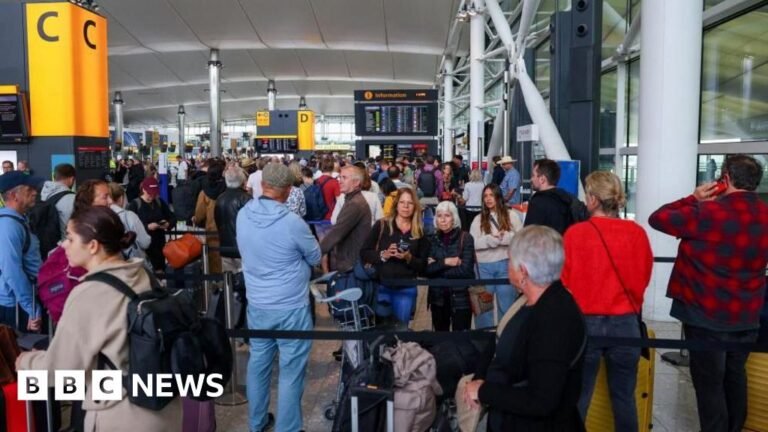Watch: Sea of people seen at Brussels airport
Air travellers are facing another day of disruption at several European airports including Heathrow, after a cyber-attack knocked out a check-in and baggage system.
There were hundreds of delays on Saturday after the software used by several airlines failed, with affected airports boarding passengers using pen and paper.
Brussels Airport said it had “no indication yet” when the system would be functional again and had asked airlines to cancel half their departing flights.
RTX, which owns software provider Collins Aerospace, said it was “aware of a cyber-related disruption” to its system in “select airports” and that it hoped to resolve the issue as quickly as possible.
It identified its Muse software – which allows different airlines to use the same check-in desks and boarding gates at an airport, rather than requiring their own – as the system that had been affected.
The company has yet to disclose what went wrong or how long it expects the outage to last.
Heathrow said on Sunday that efforts to resolve the issue were ongoing.
It apologised to those who had faced delays but stressed that “the vast majority of flights have continued to operate”, urging passengers to check their flight status before travelling to the airport and arrive in good time.
The BBC understands that British Airways has continued to operate as normal at the airport using a back-up system, but that most other airlines that service it had been affected by the outage.
There were hours-long queues on Saturday and some 47% of Heathrow’s departing flights were delayed, according to flight tracker FlightAware. Additional staff were at hand in check-in areas to help minimise disruption.
Lucy Spencer told the BBC that she had queued to check in for a Malaysia Airlines flight for more than two hours, and that staff had been checking passengers in over the phone.
Another passenger, Monazza Aslam, said she had to wait since the early hours of the morning with her elderly parents, and that the delays meant they had missed their connecting flight.
Reuters
Travellers at Heathrow report multi-hour delays and long queues at check-in
Brussels Airport said manual check-in would continue on Sunday and that extra staff had been drafted in to help minimise disruption.
It said 44 departing flights had been cancelled so far on Sunday, and that it anticipated long queues at check-in and further delays.
Europe’s combined aviation safety organisation, Eurocontrol, said airline operators had been asked to cancel half their flight schedules to and from the airport until 02:00 on Monday due to the disruption.
Meanwhile, Dublin Airport said that while the technical issues persisted and some airlines were continuing to check in manually, it was expecting to operate a full schedule on Sunday.
A spokesperson told the BBC: “Passengers are advised to contact their airline directly for updates on their flight.”
Berlin Brandenburg Airport is asking travellers to use online or self-service check-in instead of the desks while the outage is ongoing.
It said there had been eight cancellations in and out of the airport on Saturday, but that delays were generally less than 45 minutes.
EasyJet and Ryanair, which do not operate out of Heathrow but are among Europe’s biggest airlines, said on Saturday that they were operating as normal.
Reuters
Long queues and large crowds could be seen at Brussels Airport on Saturday morning
A National Cyber Security Centre spokesperson said on Saturday that it was working with Collins Aerospace, affected UK airports, the Department for Transport and law enforcement to fully understand the impact of the incident.
The European Commission, which plays a role in managing airspace across Europe, said it was “closely monitoring the cyber-attack”, but that there was no indication it had been “widespread or severe”.
Transport Secretary Heidi Alexander also said she was aware of the incident and was “getting regular updates and monitoring the situation”.
It was only last July that a global IT crash due to a faulty software update from cybersecurity firm Crowdstrike caused disruption to aviation, grounding flights across the US.
Analysts said at the time that the incident highlighted how the industry could be vulnerable to issues with digital systems.
